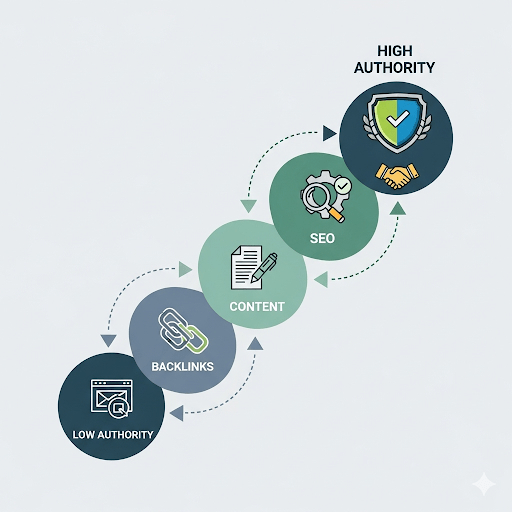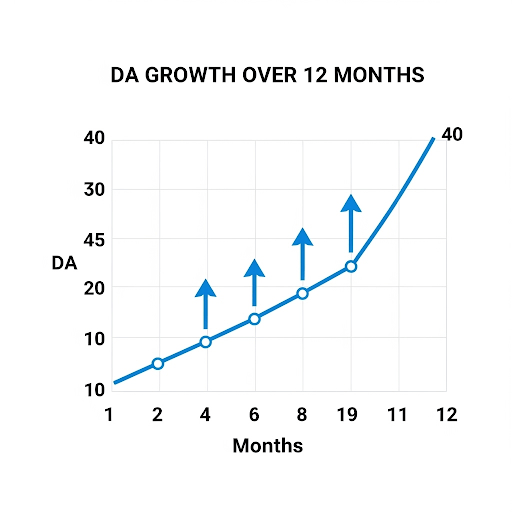Website Authority Checker: Easy 2025 Guide
Introduction: Why Website Authority Matters
Have you ever wondered why some websites just dominate search results while others barely show up? It’s not always about having the fanciest design or the catchiest headlines—it often comes down to website authority.
Think of website authority like your site’s reputation score in Google’s eyes. The higher it is, the more trustworthy your site seems—and the better chance you have to rank. And yeah, here’s the good part: you can actually measure it using a website authority checker.
In this guide, I’ll walk you through what website authority really means, how to check it, which tools actually work in 2025, and how you can steadily increase it. So, whether you’re running a blog, an eCommerce store, or a service-based site, this is your step-by-step playbook.

What is Website Authority?
Before you start plugging your site into a website authority checker, let’s break down what this metric actually means.
Website authority is a score (usually 0–100) that shows how likely a website is to rank in search engines.
It’s not an official Google metric—but it’s based on signals like backlinks, content quality, and domain trustworthiness.
Higher authority = better rankings, more organic traffic, and stronger visibility.
Related terms you’ll hear:
Domain Authority (DA) → Moz’s popular metric.
Domain Rating (DR) → Ahrefs’ version.
Authority Score → Semrush’s version.
They’re all slightly different, but they point to the same thing: how strong your website looks in the SEO world
Why Use a Website Authority Checker?
So, why bother? Can’t you just focus on writing content and let Google handle the rest? Well… not really.
Here’s why checking your authority matters:
Benchmarking: See where your site stands compared to competitors.
Tracking Progress: Monitor if your SEO efforts are paying off.
Finding Opportunities: Identify high-authority sites to get backlinks from.
Client Reporting: If you run an agency, authority scores make reports more convincing.
Basically, using a website authority checker is like checking your credit score—it tells you if you’re on the right track.
Best Website Authority Checker Tools in 2025
There are dozens of tools out there, but some stand out. Here are the most reliable ones right now:
1. Moz Domain Authority Checker
Measures DA on a 0–100 scale.
Simple to use—just enter a domain.
Great for quick checks.
try Moz’s free DA checker here
2. Ahrefs Domain Rating (DR)
Known for accurate backlink analysis.
Shows the quality and quantity of referring domains.
Best for link-building strategies.
3. Semrush Authority Score
Combines traffic data + backlinks.
Good for overall SEO health checks.
Works well if you’re already using Semrush.
4. Ubersuggest Website Authority Checker
Budget-friendly tool by Neil Patel.
Easy interface for beginners.
Also shows keyword data alongside authority.
5. Free Authority Checkers
Some free tools let you get quick results without subscriptions, like:
Small SEO Tools
Website SEO Checker
Pro Tip: Don’t obsess over which authority score is “the best.” They’re all estimates. What matters is tracking your progress over time.

How Website Authority is Calculated
You might wonder: how do these tools actually score my website?
Well, here’s the breakdown (simplified):
Backlinks: More high-quality backlinks = higher authority.
Referring Domains: A variety of domains matters more than thousands from one site.
Content Quality: Helpful, original content keeps authority stable.
Traffic Signals: High traffic can indicate trust.
Spam Score: Too many shady links? Your score drops.
It’s like a trust formula. The more signals that show your site is valuable, the higher your website authority checker score will climb.

How to Use a Website Authority Checker (Step by Step)
Here’s a quick workflow:
Go to your favorite tool (Moz, Ahrefs, Semrush, etc.).
Enter your website URL.
Check the authority score.
Compare it with competitors in your niche.
Repeat monthly to track progress.
Example: If your site has a DA of 25 and competitors average around 50, you know you’ve got some catching up to do—but at least you have a target.
Practical Tips to Increase Website Authority
Okay, so you checked your score and maybe it’s not where you want it to be. Don’t stress—authority builds over time. Here are proven ways to push it higher:
1. Build Quality Backlinks
Guest posting on high-authority blogs.
Reaching out for resource page links.
Using broken link building.
2. Improve Content Depth
Google rewards sites that actually solve problems.
Use case studies, real data, and actionable steps.
Aim for long-form (like this post!) when possible.
3. Fix Technical SEO
Ensure fast load speed.
Optimize mobile usability.
Use proper internal linking.
4. Boost On-Page SEO
Include target keywords naturally.
Use engaging titles & meta descriptions.
Add structured data (where relevant).
5. Avoid Spammy Tactics
Don’t buy links from shady sellers.
Keep anchor text diverse.
Regularly audit your backlink profile.
Authority is like trust—it takes time to build but seconds to lose.
If you want a professional, SEO-friendly website that builds authority from day one, Check Our Website Development Services

FAQs About Website Authority Checker
Q1. Is website authority the same as Google ranking?
No. Authority helps you rank, but it’s not the only factor. Google doesn’t officially use “DA” or “DR.”
Q2. What’s a good authority score?
0–20: New or small sites.
20–50: Growing authority.
50–70: Strong, competitive site.
70+: Big authority players (think HubSpot, Wikipedia, etc.).
Q3. How often should I check my authority?
Monthly is enough. Checking daily won’t show meaningful changes.
Q4. Can I rank with low authority?
Yes! Niche, low-competition keywords can bring traffic even if your authority is low.
Q5. Which tool gives the “most accurate” score?
None—it’s all relative. Use one tool consistently to track growth.
Common Mistakes When Using Website Authority Checkers
Obsessing over numbers – Authority is important, but traffic & conversions matter more.
Switching tools too often – Stick with one to track trends.
Ignoring content quality – Links alone won’t help if content is weak.
Comparing across industries – A DA 40 site in health may be weaker than a DA 25 in finance—competition differs.
Real-World Example: How Authority Growth Looks
Let’s say you start a blog in January with a DA of 10.
By March, after publishing 20 helpful articles and gaining a few backlinks, you’re at 18.
By June, you get featured in a niche directory—your DA jumps to 25.
By December, after consistent link building and SEO, you’re hitting 40+.
It’s slow, but consistent progress compounds.

Conclusion: Check, Track, and Grow
At the end of the day, a website authority checker is just a tool—it gives you a number. But what you do with that number is what makes the difference.
Use it to benchmark.
Improve content + backlinks.
Track growth consistently.
So, don’t chase numbers for the sake of it. Focus on building a site that people actually trust, visit, and share. The authority will follow.
Ready to see how strong your website is? Fire up a website authority checker today, compare yourself with competitors, and start working on that growth strategy.
